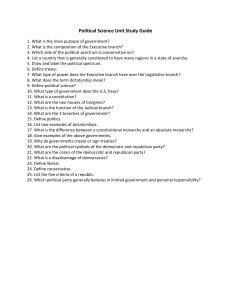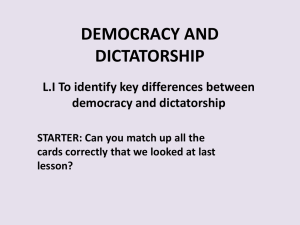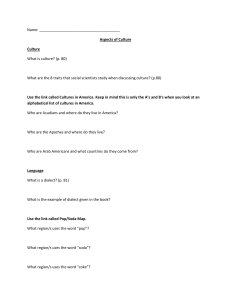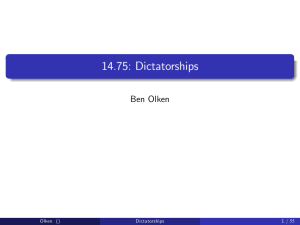7 Reasons Why Dictatorship Is The Best Path To Development
advertisement
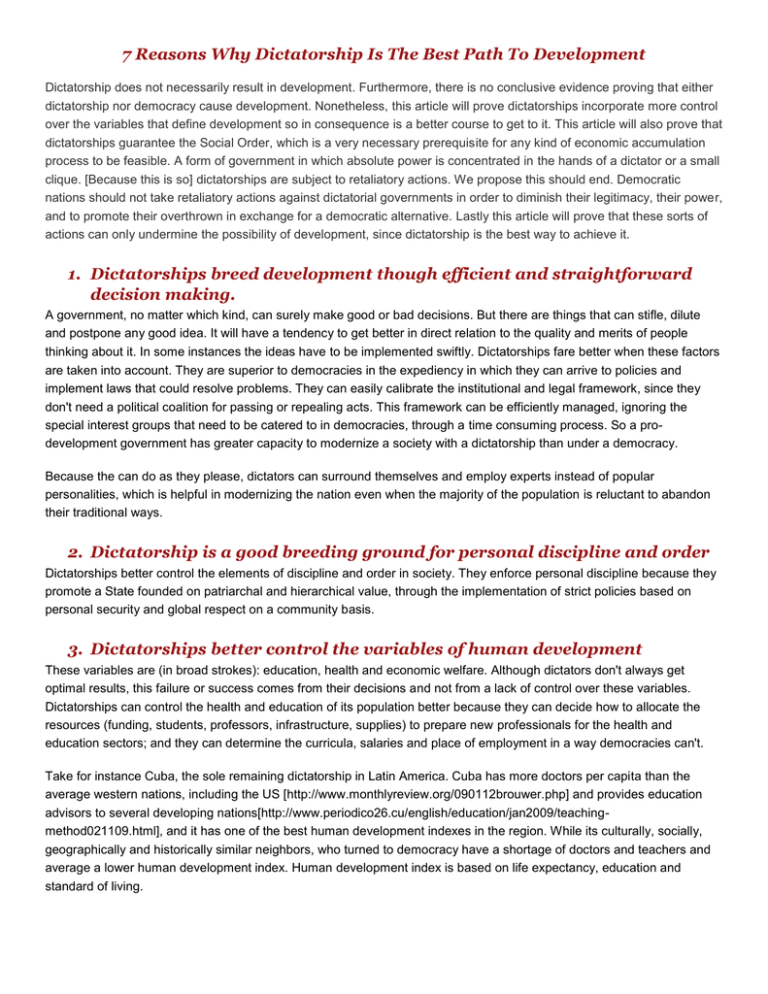
7 Reasons Why Dictatorship Is The Best Path To Development Dictatorship does not necessarily result in development. Furthermore, there is no conclusive evidence proving that either dictatorship nor democracy cause development. Nonetheless, this article will prove dictatorships incorporate more control over the variables that define development so in consequence is a better course to get to it. This article will also prove that dictatorships guarantee the Social Order, which is a very necessary prerequisite for any kind of economic accumulation process to be feasible. A form of government in which absolute power is concentrated in the hands of a dictator or a small clique. [Because this is so] dictatorships are subject to retaliatory actions. We propose this should end. Democratic nations should not take retaliatory actions against dictatorial governments in order to diminish their legitimacy, their power, and to promote their overthrown in exchange for a democratic alternative. Lastly this article will prove that these sorts of actions can only undermine the possibility of development, since dictatorship is the best way to achieve it. 1. Dictatorships breed development though efficient and straightforward decision making. A government, no matter which kind, can surely make good or bad decisions. But there are things that can stifle, dilute and postpone any good idea. It will have a tendency to get better in direct relation to the quality and merits of people thinking about it. In some instances the ideas have to be implemented swiftly. Dictatorships fare better when these factors are taken into account. They are superior to democracies in the expediency in which they can arrive to policies and implement laws that could resolve problems. They can easily calibrate the institutional and legal framework, since they don't need a political coalition for passing or repealing acts. This framework can be efficiently managed, ignoring the special interest groups that need to be catered to in democracies, through a time consuming process. So a prodevelopment government has greater capacity to modernize a society with a dictatorship than under a democracy. Because the can do as they please, dictators can surround themselves and employ experts instead of popular personalities, which is helpful in modernizing the nation even when the majority of the population is reluctant to abandon their traditional ways. 2. Dictatorship is a good breeding ground for personal discipline and order Dictatorships better control the elements of discipline and order in society. They enforce personal discipline because they promote a State founded on patriarchal and hierarchical value, through the implementation of strict policies based on personal security and global respect on a community basis. 3. Dictatorships better control the variables of human development These variables are (in broad strokes): education, health and economic welfare. Although dictators don't always get optimal results, this failure or success comes from their decisions and not from a lack of control over these variables. Dictatorships can control the health and education of its population better because they can decide how to allocate the resources (funding, students, professors, infrastructure, supplies) to prepare new professionals for the health and education sectors; and they can determine the curricula, salaries and place of employment in a way democracies can't. Take for instance Cuba, the sole remaining dictatorship in Latin America. Cuba has more doctors per capita than the average western nations, including the US [http://www.monthlyreview.org/090112brouwer.php] and provides education advisors to several developing nations[http://www.periodico26.cu/english/education/jan2009/teachingmethod021109.html], and it has one of the best human development indexes in the region. While its culturally, socially, geographically and historically similar neighbors, who turned to democracy have a shortage of doctors and teachers and average a lower human development index. Human development index is based on life expectancy, education and standard of living. A dictator’s survival depends on economic success of his country. There is a need to arrive to a balance between predation (taxation of subjects) and the repression necessary to avoid the risk of insurrection. He can't take away too much or repress too much lest he is deposed. 4. Dictatorships resist to income Redistribution Pressures Authoritarian states' resistance to income distributional pressures is key to their successful development, because the decision makers can organize against short term pork-barrel politics that plague democracy. These pork-barrel projects are often spearheaded by interest groups or "distributional coalitions" which pursue their own selfish interests at the expense of overall economic efficiency. Dictatorship is largely resistant to this special interest. 5. Dictatorship is a more economic institution: elections are a luxury reserved for developed countries. The resources needed to maintain democratic institutions and regular elections -the costs of electoral process, and electoral propaganda, political patronage, the interruption of long term government plans and projects- are a unnecessary expense that developing nations can't fork over. [The exorbitant amounts of money spent on elections could be better spent within developing countries.] 6. Dictatorships regimes can be a path for countries move on from civil wars and focus on development When a country is going through a civil war or has internal tensions escalating, a dictatorship can resolve this conflicts in a more definite way than in democracies. Because under a democracy the minority can wait until the conditions are met for them to come to power and once they do, take revenge on the other group, thus escalating the conflict between the factions. However under a dictatorship, the ruler has total power and hence, there are no more power quotas to fight for anymore. 7. The longer lasting and biggest economic miracles have occurred under dictatorships We contend that economic miracles of greater magnitude and with the longest lasting effects have occurred in countries under a dictatorship: “The most rapidly growing country in the 1970’s was the military-ruled Brazil. The economic tigers of the 1980 were the dictatorships of South Korea, Taiwan and Singapore. In the 1990’s the leader was China. When talking about economic miracles, as in the Chilean miracle, academics are referring to states where there has been registered unprecedented growth. The comprehensive list includes: The Baltic Tiger (Estonia, Latvia and Lithuania), Brazil, Ireland, The Asian tigers (Taiwan, South Korea, Hong-Kong and Singapore), Italy, Greece, Japan, Chile, Spain, Austria and W. Germany after WWII and France after WWII.
